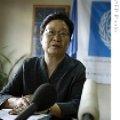U.N. deputy humanitarian chief Catherine Bragg said Sudan's decision to expel 13 aid organizations in north Sudan will have immediate effect on the ability to deliver humanitarian assistance in the whole country, but especially in Darfur, where 4.7 million people receive aid. "We are deeply concerned about the decision of the government of Sudan which will have devastating effect on their own citizens in Darfur," she said. "These agencies are vital implementing partners for the United Nations and account for at least half of the humanitarian capacity in Darfur. It removes 40 percent of the aid workers in Darfur - roughly 6,500 national and international staff." The list of aid groups ordered out include Action Contre La Faim (ACF), Care International, CHF International, International Rescue Committee, Mercy Corps, both the French and Dutch branches of Doctors without Borders, the Norwegian Refugee Council, Oxfam, PADCO, Solidarités, and both the British and U.S. branches of Save the Children.
U.N. Secretary-General Ban Ki-moon also expressed his concern about the action. In a statement, he urged the government of Sudan to reconsider its decision, saying it if it is implemented, it will cause "irrevocable damage" to humanitarian operations there. Catherine Bragg said some aid groups were given only 24 hours to leave. She said the United Nations is now working to assist these agencies in bringing their staff members back from the field to Khartoum, where they will get exit visas to leave the country.
Also troubling is the way in which the government has gone about expelling the charities.
"Sudanese officials also requested some agencies to hand over a list of their assets, and in some cases have begun to gather banking details and confiscated office equipment such as computers, communications equipment and vehicles," she said. Bragg said the United Nations is deeply concerned about the safety and security of the aid workers and that the government's actions are contrary to the assurances the United Nations received that humanitarian operations would be protected and assistance would continue. More worrying, she said is the situation of those who need their help.
"This will have profound implication on the delivery of humanitarian assistance in Darfur and in Sudan," said Bragg. "We are even more deeply concerned about the welfare of the 4.6 million conflict affected people in Darfur. With loss of these NGOs, 1.1 million people will be without food aid, 1.1 million will be without health care, and over 1 million without potable water." Bragg said the United Nations is looking into contingency plans on how to fill the gaps, including asking the remaining aid groups and the Sudanese government to help, in addition to stepping up its own humanitarian operations.
By Margaret Besheer United Nations 05 March 2009

